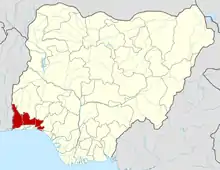Sagamu
Orisagamu | |
|---|---|
LGA | |
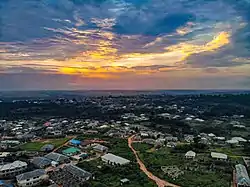 Araromi neighbourhood | |
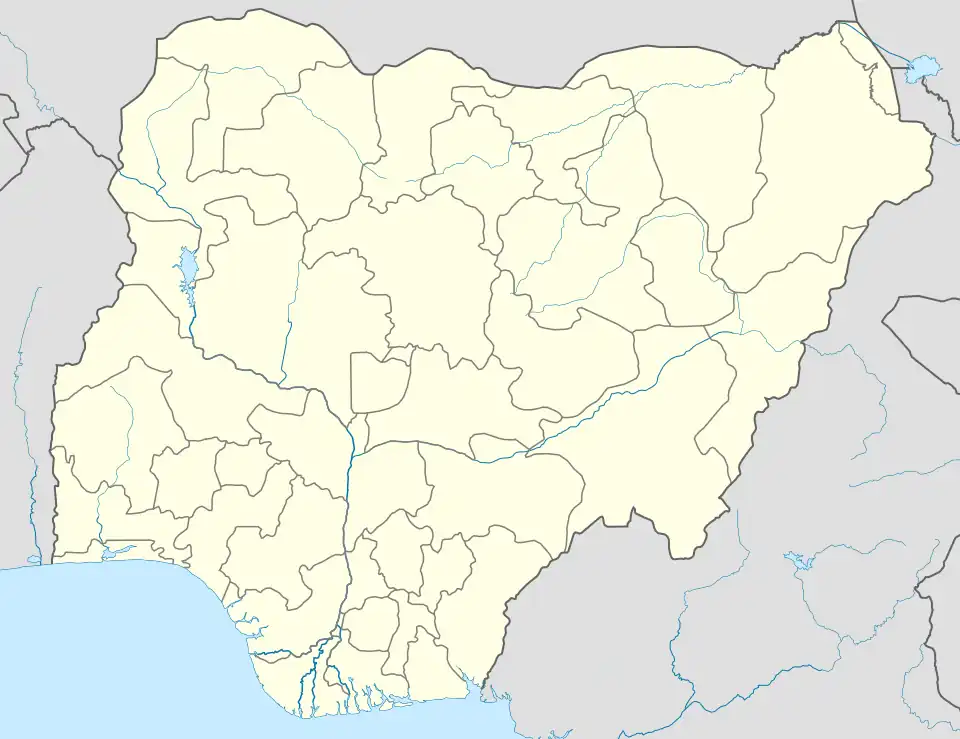 Sagamu Location in Nigeria | |
| Coordinates: 6°50′N 3°39′E / 6.833°N 3.650°E | |
| Country | |
| State | Ogun State |
| LGA(s) | Sagamu |
| Government | |
| • Local Government Chairman | Odulate Olashile (APC) |
| Area | |
| • Total | 614 km2 (237 sq mi) |
| Population (2006 census) | |
| • Total | 253,412 |
| Time zone | UTC+1 (WAT) |
| 3-digit postal code prefix | 121[1] |
| ISO 3166 code | NG.OG.SH |
| National language | Yorùbá |
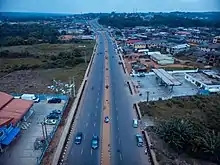
| Total population | |
|---|---|
| ~ 1,132,270 (2011) | |
| Regions with significant populations | |
| Ogun State - 512,750 · Remo North: 70,470 · Ikenne: 140,490 · Shagamu: 301,790 Lagos State - 619,520 · Ikorodu: 619,520 | |
| Religion | |
| Christianity · Islam · Yoruba religion |
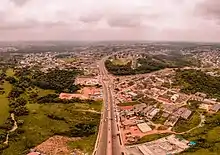
Sagamu or Ishagamu is an agglomeration of thirteen towns in southwestern Nigeria. It is located in Ogun State along the Ibu River and Eruwuru Stream between Lagos and Ibadan. It was founded in the mid 19th century by members of the Remo branch of the Yoruba people.[2] The 13 towns are: Makun, Offin, Sonyindo, Epe, Ibido, Igbepa, Ado, Oko, Ipoji, Batoro, Ijoku, Ijagba and Latawa.[3][4] It is the capital of Remo Kingdom, and the paramount ruler of the kingdom, the Akarigbo of Remo, has his palace is in the town of Offin.
The Sagamu region is underlain by major deposits of limestone, which is used in the city's major industry, the production of cement. Agricultural products of the region include cocoa and kola nuts. Sagamu is the largest kola nut collecting center in the country. The kola nut industry supports several secondary industries such as basket and rope manufacturing, which are used to store the kola nuts.
The city was founded in the mid-19th century when several small towns united for purpose of defense during the wars brought about by the fall of the Oyo Empire. Sagamu controlled the trade routes between the ports in the Niger Delta and the Yoruba mainland until the British occupied the city at the end of the 19th century. Sagamu has experienced both population and economic growth since the 1950s, due to its position between the cities of Ibadan and Lagos. The population in 1995 was 114,300 but 2007 estimates placed it as high as 228,382. The Olabisi Onabanjo University's college of medicine is located in Sagamu.[5]
Sagamu (Offin - Ile) is the new seat of the Akarigbo of Remo ("King" or "Lord" of Remo), the traditional ruler of the Remo Kingdom. The former seat was located in a farther area of Offin. Four ruling families are eligible to wear the beaded crown of the Akarigbo, all descending from the first Oba, Akarigbo, a prince of the house of Oduduwa. The current Akarigbo was installed and crowned as King in 2017. Notable areas within Sagamu include Offin, Itunshokun, Sabo, Makun, Ajaka, Makun Station, Isale-oko, Isote, Epe, Soyindo, Surulere, Ijagba, Ewu-Oluwo, Ogijo, Simawa, GRA, Ijokun, Batoro. Ijebu language, a dialect of the Yoruba language, is spoken in Sagamu.
Administration
The old Sagamu Local Government has been divided into Three(3) Local Council Development Areas namely Sagamu West LCDA, Sagamu Central LCDA and Sagamu South LCDA.
For Administrative convenience, Sagamu Local Government is divided into (15) Fifteen Political Wards, namely.
- Ward 1 – Oko, Epe & Itunla 1
- Ward 2 – Oko, Epe Itunla II
- Ward 3 – AiyegbamijIjoku
- Ward 4 – Sabo 1
- Ward 5 – Sabo II
- Ward 6 – Itunsokun Oyebajo
- Ward 7 – Ijagba
- Ward 8 – Latawa
- Ward 9 – Ode-lemo
- Ward 10 – OgijojIkosi
- Ward 11 – Surulere
- Ward 12 – Isote
- Ward 13 – Simawa
- Ward 14 – Agbowa
- Ward 15 – Ibidojitun Alara
Notable people
- Adebayo Ogunlesi, a businessman
- Anthony Joshua, a sportsperson
- Gbenga Daniel, a politician.
- Babatunde Adewale Ajayi, the current Sagamu king
Photo Gallery of Sagamu
 Aafin Akarigo palace
Aafin Akarigo palace Akarigbo Palace
Akarigbo Palace Methodist church Nigeria
Methodist church Nigeria Methodist church
Methodist church Sagamu central mosque
Sagamu central mosque St. John church
St. John church
External links
![]() Sagamu travel guide from Wikivoyage
Sagamu travel guide from Wikivoyage
References
- ↑ "Post Offices- with map of LGA". NIPOST. Archived from the original on 2012-11-26. Retrieved 2009-10-20.
- ↑ "Shagamu | Nigeria". Encyclopedia Britannica. Retrieved 2019-10-15.
- ↑ "Shagamu time now. Local current time and time zone in Shagamu / Ogun / Nigeria - Current-Time.World". current-time.world. Retrieved 2020-05-25.
- ↑ "Remo Town in Ogun Nigeria Guide". www.nigeriagalleria.com. Retrieved 2020-05-25.
- ↑ "The World Gazetteer". Archived from the original on 2013-02-10. Retrieved 2007-04-06.
